BSc BMP3003 Business Management: Academic Integrity & Skills Report
VerifiedAdded on 2023/06/17
|8
|1923
|80
Report
AI Summary
This report provides an overview of academic skills and integrity within a BSc (Hons) Business Management with Foundation program, specifically addressing the BMP3003 Further Academic Skills module. It begins by defining academic integrity and discussing its importance in higher education, emphasizing respect, trust, fairness, and honesty. The report then examines the implications of academic misconduct, including plagiarism, highlighting potential consequences such as damaged reputation, failing grades, and legal repercussions. Furthermore, the report reflects on the skills acquired during the production of a game for Assignment 2, focusing on learning, creativity, time management, and teamwork skills. The conclusion summarizes the significance of academic integrity and the value of skills development in shaping a student's career, with references to relevant academic sources.
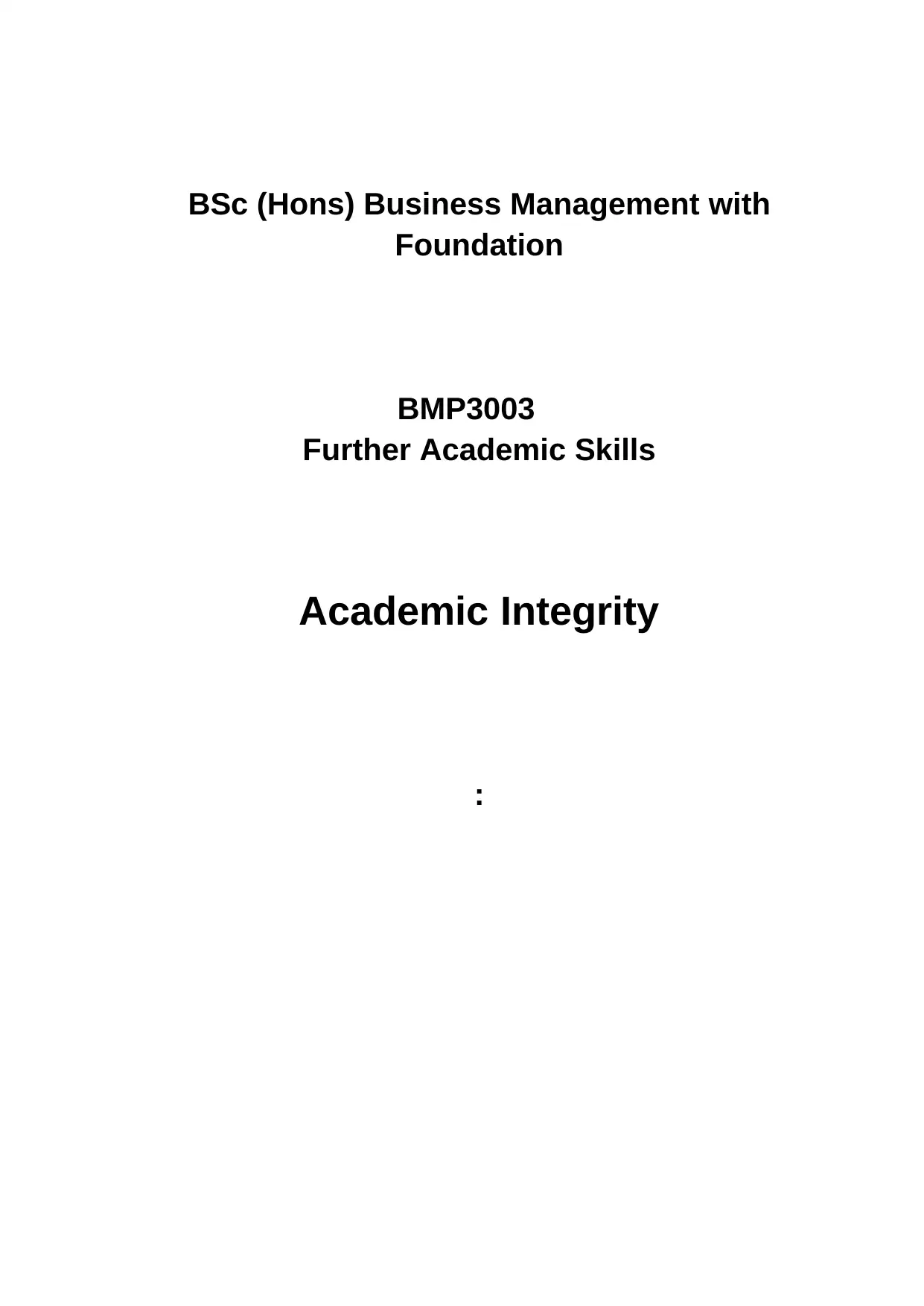
BSc (Hons) Business Management with
Foundation
BMP3003
Further Academic Skills
Academic Integrity
:
Foundation
BMP3003
Further Academic Skills
Academic Integrity
:
Paraphrase This Document
Need a fresh take? Get an instant paraphrase of this document with our AI Paraphraser
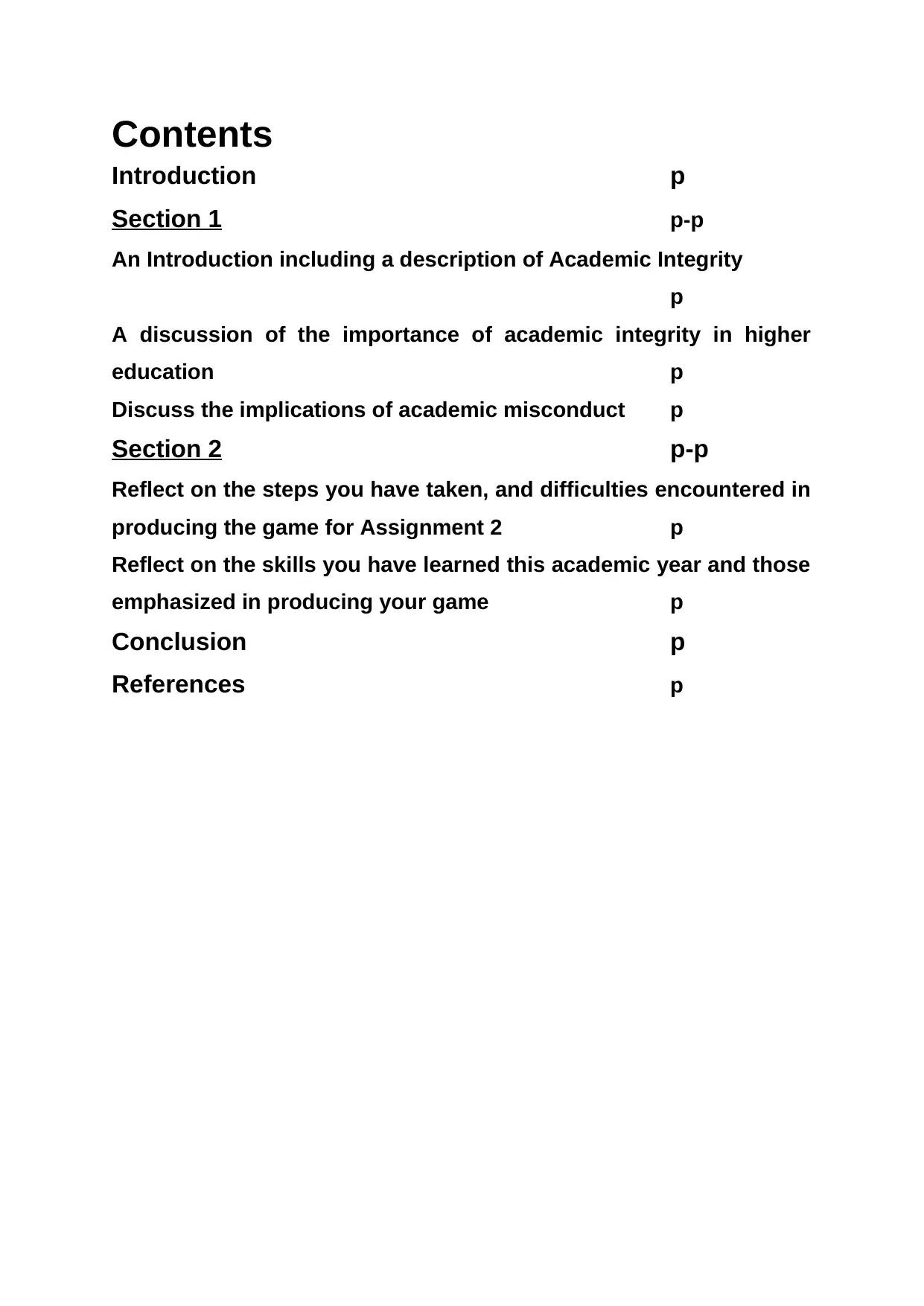
Contents
Introduction p
Section 1 p-p
An Introduction including a description of Academic Integrity
p
A discussion of the importance of academic integrity in higher
education p
Discuss the implications of academic misconduct p
Section 2 p-p
Reflect on the steps you have taken, and difficulties encountered in
producing the game for Assignment 2 p
Reflect on the skills you have learned this academic year and those
emphasized in producing your game p
Conclusion p
References p
Introduction p
Section 1 p-p
An Introduction including a description of Academic Integrity
p
A discussion of the importance of academic integrity in higher
education p
Discuss the implications of academic misconduct p
Section 2 p-p
Reflect on the steps you have taken, and difficulties encountered in
producing the game for Assignment 2 p
Reflect on the skills you have learned this academic year and those
emphasized in producing your game p
Conclusion p
References p
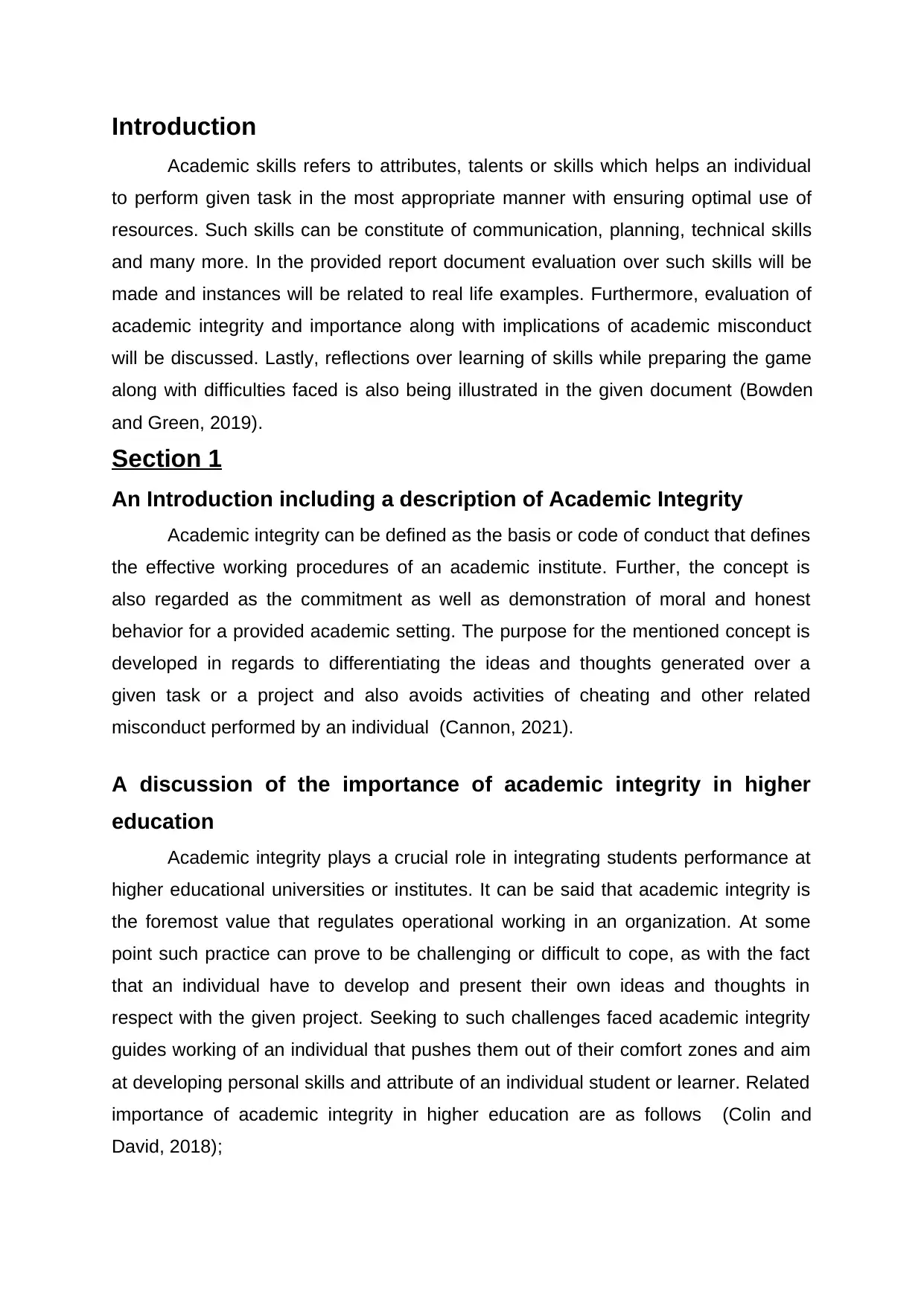
Introduction
Academic skills refers to attributes, talents or skills which helps an individual
to perform given task in the most appropriate manner with ensuring optimal use of
resources. Such skills can be constitute of communication, planning, technical skills
and many more. In the provided report document evaluation over such skills will be
made and instances will be related to real life examples. Furthermore, evaluation of
academic integrity and importance along with implications of academic misconduct
will be discussed. Lastly, reflections over learning of skills while preparing the game
along with difficulties faced is also being illustrated in the given document (Bowden
and Green, 2019).
Section 1
An Introduction including a description of Academic Integrity
Academic integrity can be defined as the basis or code of conduct that defines
the effective working procedures of an academic institute. Further, the concept is
also regarded as the commitment as well as demonstration of moral and honest
behavior for a provided academic setting. The purpose for the mentioned concept is
developed in regards to differentiating the ideas and thoughts generated over a
given task or a project and also avoids activities of cheating and other related
misconduct performed by an individual (Cannon, 2021).
A discussion of the importance of academic integrity in higher
education
Academic integrity plays a crucial role in integrating students performance at
higher educational universities or institutes. It can be said that academic integrity is
the foremost value that regulates operational working in an organization. At some
point such practice can prove to be challenging or difficult to cope, as with the fact
that an individual have to develop and present their own ideas and thoughts in
respect with the given project. Seeking to such challenges faced academic integrity
guides working of an individual that pushes them out of their comfort zones and aim
at developing personal skills and attribute of an individual student or learner. Related
importance of academic integrity in higher education are as follows (Colin and
David, 2018);
Academic skills refers to attributes, talents or skills which helps an individual
to perform given task in the most appropriate manner with ensuring optimal use of
resources. Such skills can be constitute of communication, planning, technical skills
and many more. In the provided report document evaluation over such skills will be
made and instances will be related to real life examples. Furthermore, evaluation of
academic integrity and importance along with implications of academic misconduct
will be discussed. Lastly, reflections over learning of skills while preparing the game
along with difficulties faced is also being illustrated in the given document (Bowden
and Green, 2019).
Section 1
An Introduction including a description of Academic Integrity
Academic integrity can be defined as the basis or code of conduct that defines
the effective working procedures of an academic institute. Further, the concept is
also regarded as the commitment as well as demonstration of moral and honest
behavior for a provided academic setting. The purpose for the mentioned concept is
developed in regards to differentiating the ideas and thoughts generated over a
given task or a project and also avoids activities of cheating and other related
misconduct performed by an individual (Cannon, 2021).
A discussion of the importance of academic integrity in higher
education
Academic integrity plays a crucial role in integrating students performance at
higher educational universities or institutes. It can be said that academic integrity is
the foremost value that regulates operational working in an organization. At some
point such practice can prove to be challenging or difficult to cope, as with the fact
that an individual have to develop and present their own ideas and thoughts in
respect with the given project. Seeking to such challenges faced academic integrity
guides working of an individual that pushes them out of their comfort zones and aim
at developing personal skills and attribute of an individual student or learner. Related
importance of academic integrity in higher education are as follows (Colin and
David, 2018);
⊘ This is a preview!⊘
Do you want full access?
Subscribe today to unlock all pages.

Trusted by 1+ million students worldwide
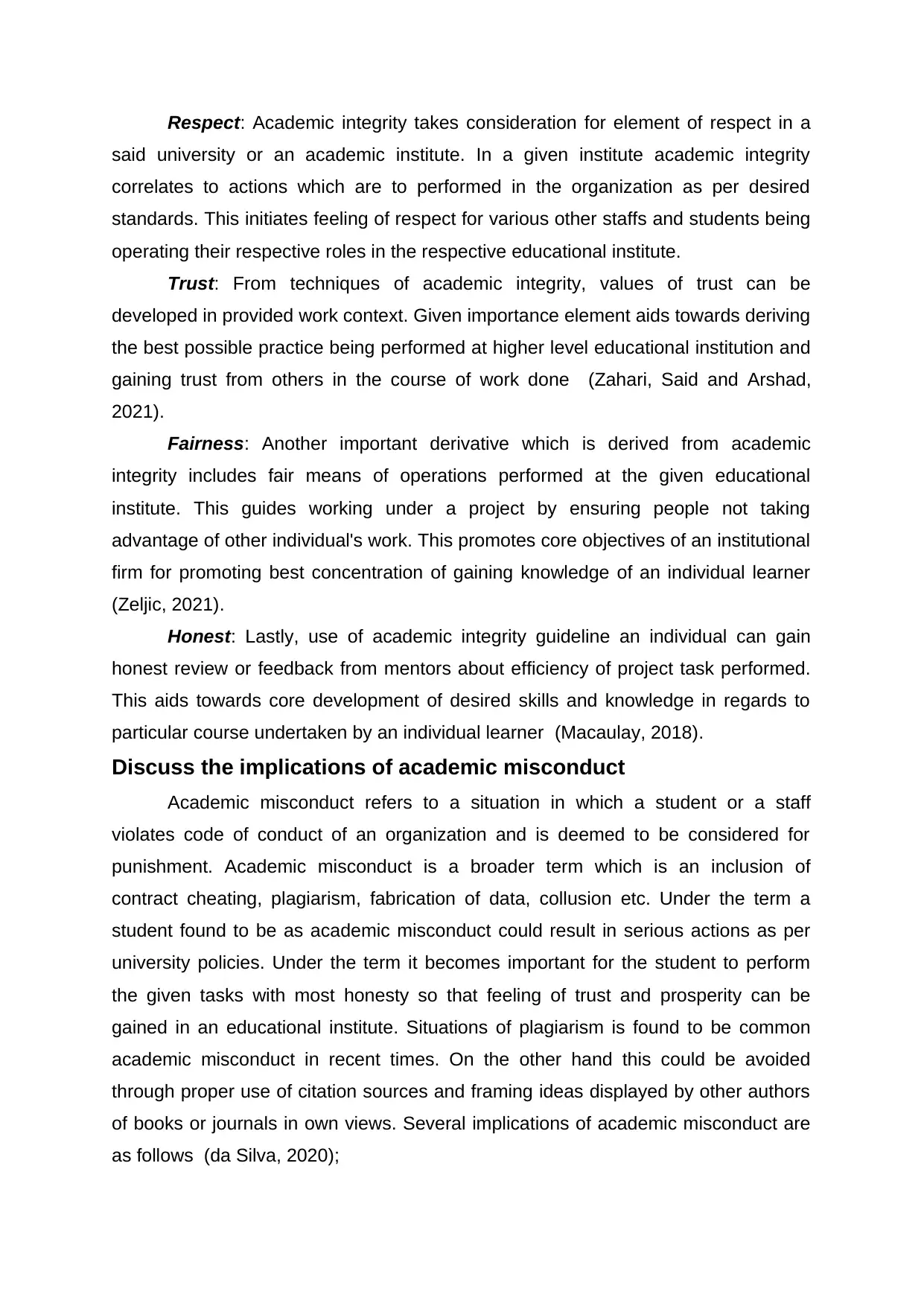
Respect: Academic integrity takes consideration for element of respect in a
said university or an academic institute. In a given institute academic integrity
correlates to actions which are to performed in the organization as per desired
standards. This initiates feeling of respect for various other staffs and students being
operating their respective roles in the respective educational institute.
Trust: From techniques of academic integrity, values of trust can be
developed in provided work context. Given importance element aids towards deriving
the best possible practice being performed at higher level educational institution and
gaining trust from others in the course of work done (Zahari, Said and Arshad,
2021).
Fairness: Another important derivative which is derived from academic
integrity includes fair means of operations performed at the given educational
institute. This guides working under a project by ensuring people not taking
advantage of other individual's work. This promotes core objectives of an institutional
firm for promoting best concentration of gaining knowledge of an individual learner
(Zeljic, 2021).
Honest: Lastly, use of academic integrity guideline an individual can gain
honest review or feedback from mentors about efficiency of project task performed.
This aids towards core development of desired skills and knowledge in regards to
particular course undertaken by an individual learner (Macaulay, 2018).
Discuss the implications of academic misconduct
Academic misconduct refers to a situation in which a student or a staff
violates code of conduct of an organization and is deemed to be considered for
punishment. Academic misconduct is a broader term which is an inclusion of
contract cheating, plagiarism, fabrication of data, collusion etc. Under the term a
student found to be as academic misconduct could result in serious actions as per
university policies. Under the term it becomes important for the student to perform
the given tasks with most honesty so that feeling of trust and prosperity can be
gained in an educational institute. Situations of plagiarism is found to be common
academic misconduct in recent times. On the other hand this could be avoided
through proper use of citation sources and framing ideas displayed by other authors
of books or journals in own views. Several implications of academic misconduct are
as follows (da Silva, 2020);
said university or an academic institute. In a given institute academic integrity
correlates to actions which are to performed in the organization as per desired
standards. This initiates feeling of respect for various other staffs and students being
operating their respective roles in the respective educational institute.
Trust: From techniques of academic integrity, values of trust can be
developed in provided work context. Given importance element aids towards deriving
the best possible practice being performed at higher level educational institution and
gaining trust from others in the course of work done (Zahari, Said and Arshad,
2021).
Fairness: Another important derivative which is derived from academic
integrity includes fair means of operations performed at the given educational
institute. This guides working under a project by ensuring people not taking
advantage of other individual's work. This promotes core objectives of an institutional
firm for promoting best concentration of gaining knowledge of an individual learner
(Zeljic, 2021).
Honest: Lastly, use of academic integrity guideline an individual can gain
honest review or feedback from mentors about efficiency of project task performed.
This aids towards core development of desired skills and knowledge in regards to
particular course undertaken by an individual learner (Macaulay, 2018).
Discuss the implications of academic misconduct
Academic misconduct refers to a situation in which a student or a staff
violates code of conduct of an organization and is deemed to be considered for
punishment. Academic misconduct is a broader term which is an inclusion of
contract cheating, plagiarism, fabrication of data, collusion etc. Under the term a
student found to be as academic misconduct could result in serious actions as per
university policies. Under the term it becomes important for the student to perform
the given tasks with most honesty so that feeling of trust and prosperity can be
gained in an educational institute. Situations of plagiarism is found to be common
academic misconduct in recent times. On the other hand this could be avoided
through proper use of citation sources and framing ideas displayed by other authors
of books or journals in own views. Several implications of academic misconduct are
as follows (da Silva, 2020);
Paraphrase This Document
Need a fresh take? Get an instant paraphrase of this document with our AI Paraphraser
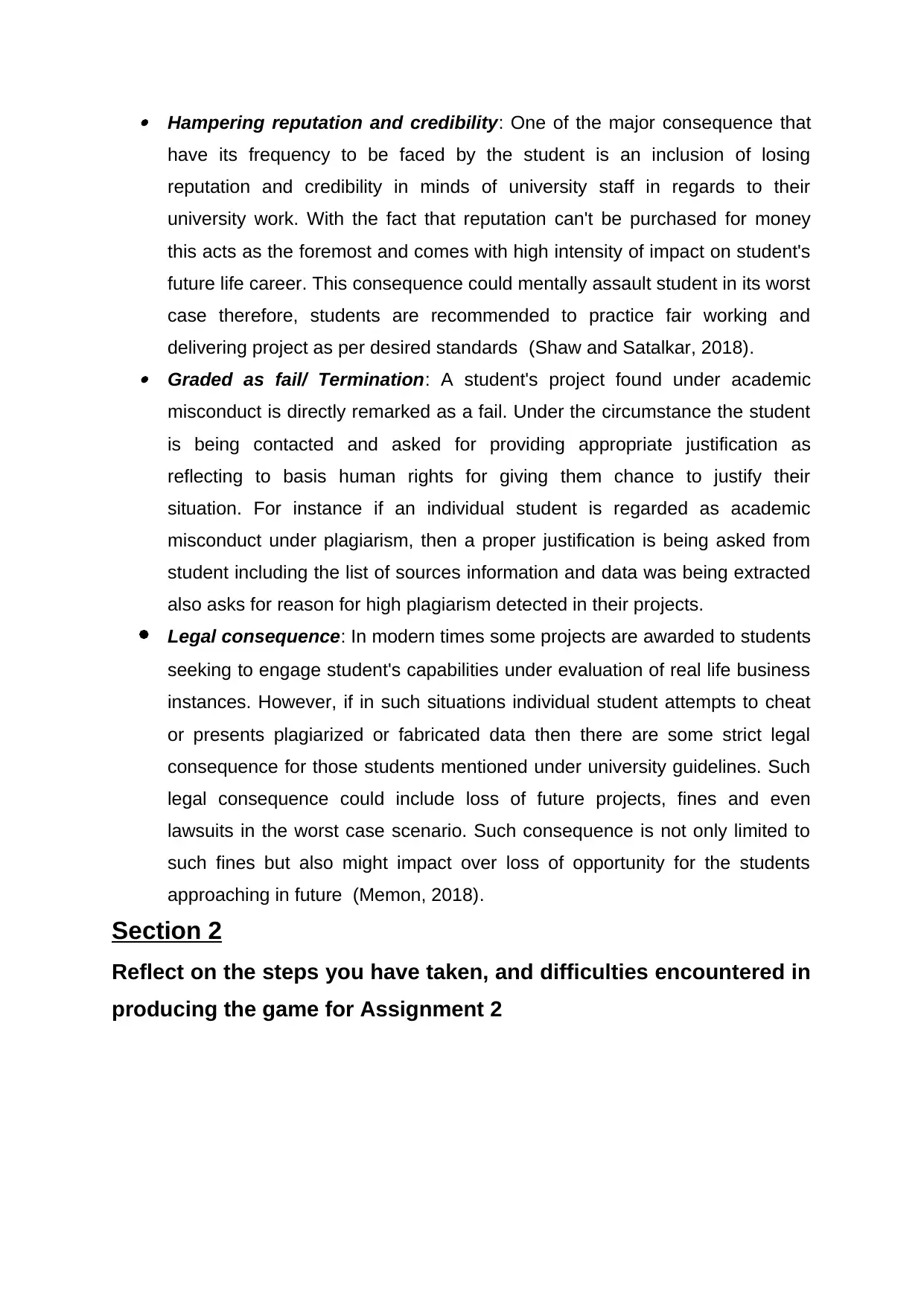
Hampering reputation and credibility: One of the major consequence that
have its frequency to be faced by the student is an inclusion of losing
reputation and credibility in minds of university staff in regards to their
university work. With the fact that reputation can't be purchased for money
this acts as the foremost and comes with high intensity of impact on student's
future life career. This consequence could mentally assault student in its worst
case therefore, students are recommended to practice fair working and
delivering project as per desired standards (Shaw and Satalkar, 2018). Graded as fail/ Termination: A student's project found under academic
misconduct is directly remarked as a fail. Under the circumstance the student
is being contacted and asked for providing appropriate justification as
reflecting to basis human rights for giving them chance to justify their
situation. For instance if an individual student is regarded as academic
misconduct under plagiarism, then a proper justification is being asked from
student including the list of sources information and data was being extracted
also asks for reason for high plagiarism detected in their projects.
Legal consequence: In modern times some projects are awarded to students
seeking to engage student's capabilities under evaluation of real life business
instances. However, if in such situations individual student attempts to cheat
or presents plagiarized or fabricated data then there are some strict legal
consequence for those students mentioned under university guidelines. Such
legal consequence could include loss of future projects, fines and even
lawsuits in the worst case scenario. Such consequence is not only limited to
such fines but also might impact over loss of opportunity for the students
approaching in future (Memon, 2018).
Section 2
Reflect on the steps you have taken, and difficulties encountered in
producing the game for Assignment 2
have its frequency to be faced by the student is an inclusion of losing
reputation and credibility in minds of university staff in regards to their
university work. With the fact that reputation can't be purchased for money
this acts as the foremost and comes with high intensity of impact on student's
future life career. This consequence could mentally assault student in its worst
case therefore, students are recommended to practice fair working and
delivering project as per desired standards (Shaw and Satalkar, 2018). Graded as fail/ Termination: A student's project found under academic
misconduct is directly remarked as a fail. Under the circumstance the student
is being contacted and asked for providing appropriate justification as
reflecting to basis human rights for giving them chance to justify their
situation. For instance if an individual student is regarded as academic
misconduct under plagiarism, then a proper justification is being asked from
student including the list of sources information and data was being extracted
also asks for reason for high plagiarism detected in their projects.
Legal consequence: In modern times some projects are awarded to students
seeking to engage student's capabilities under evaluation of real life business
instances. However, if in such situations individual student attempts to cheat
or presents plagiarized or fabricated data then there are some strict legal
consequence for those students mentioned under university guidelines. Such
legal consequence could include loss of future projects, fines and even
lawsuits in the worst case scenario. Such consequence is not only limited to
such fines but also might impact over loss of opportunity for the students
approaching in future (Memon, 2018).
Section 2
Reflect on the steps you have taken, and difficulties encountered in
producing the game for Assignment 2
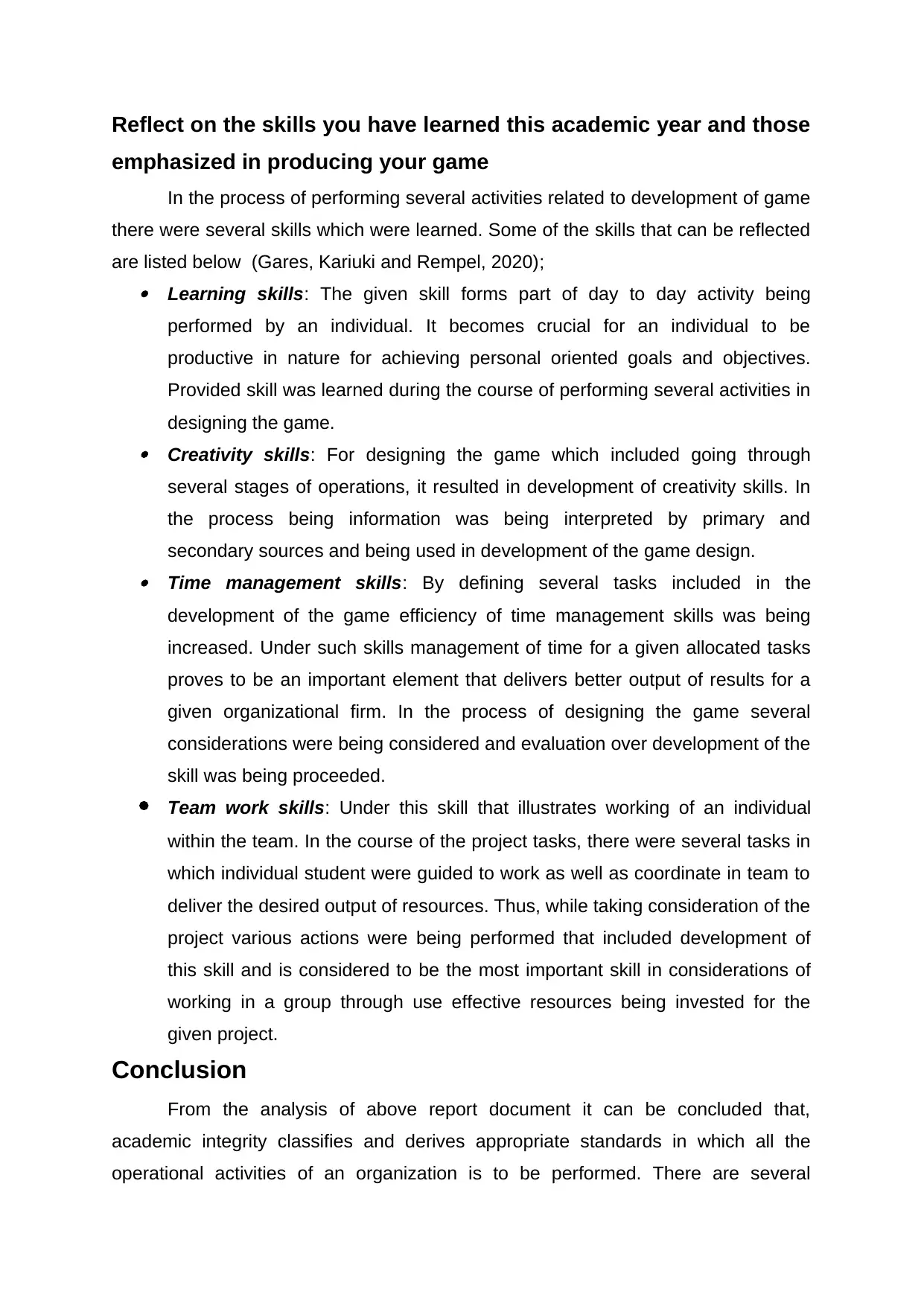
Reflect on the skills you have learned this academic year and those
emphasized in producing your game
In the process of performing several activities related to development of game
there were several skills which were learned. Some of the skills that can be reflected
are listed below (Gares, Kariuki and Rempel, 2020); Learning skills: The given skill forms part of day to day activity being
performed by an individual. It becomes crucial for an individual to be
productive in nature for achieving personal oriented goals and objectives.
Provided skill was learned during the course of performing several activities in
designing the game. Creativity skills: For designing the game which included going through
several stages of operations, it resulted in development of creativity skills. In
the process being information was being interpreted by primary and
secondary sources and being used in development of the game design. Time management skills: By defining several tasks included in the
development of the game efficiency of time management skills was being
increased. Under such skills management of time for a given allocated tasks
proves to be an important element that delivers better output of results for a
given organizational firm. In the process of designing the game several
considerations were being considered and evaluation over development of the
skill was being proceeded.
Team work skills: Under this skill that illustrates working of an individual
within the team. In the course of the project tasks, there were several tasks in
which individual student were guided to work as well as coordinate in team to
deliver the desired output of resources. Thus, while taking consideration of the
project various actions were being performed that included development of
this skill and is considered to be the most important skill in considerations of
working in a group through use effective resources being invested for the
given project.
Conclusion
From the analysis of above report document it can be concluded that,
academic integrity classifies and derives appropriate standards in which all the
operational activities of an organization is to be performed. There are several
emphasized in producing your game
In the process of performing several activities related to development of game
there were several skills which were learned. Some of the skills that can be reflected
are listed below (Gares, Kariuki and Rempel, 2020); Learning skills: The given skill forms part of day to day activity being
performed by an individual. It becomes crucial for an individual to be
productive in nature for achieving personal oriented goals and objectives.
Provided skill was learned during the course of performing several activities in
designing the game. Creativity skills: For designing the game which included going through
several stages of operations, it resulted in development of creativity skills. In
the process being information was being interpreted by primary and
secondary sources and being used in development of the game design. Time management skills: By defining several tasks included in the
development of the game efficiency of time management skills was being
increased. Under such skills management of time for a given allocated tasks
proves to be an important element that delivers better output of results for a
given organizational firm. In the process of designing the game several
considerations were being considered and evaluation over development of the
skill was being proceeded.
Team work skills: Under this skill that illustrates working of an individual
within the team. In the course of the project tasks, there were several tasks in
which individual student were guided to work as well as coordinate in team to
deliver the desired output of resources. Thus, while taking consideration of the
project various actions were being performed that included development of
this skill and is considered to be the most important skill in considerations of
working in a group through use effective resources being invested for the
given project.
Conclusion
From the analysis of above report document it can be concluded that,
academic integrity classifies and derives appropriate standards in which all the
operational activities of an organization is to be performed. There are several
⊘ This is a preview!⊘
Do you want full access?
Subscribe today to unlock all pages.

Trusted by 1+ million students worldwide
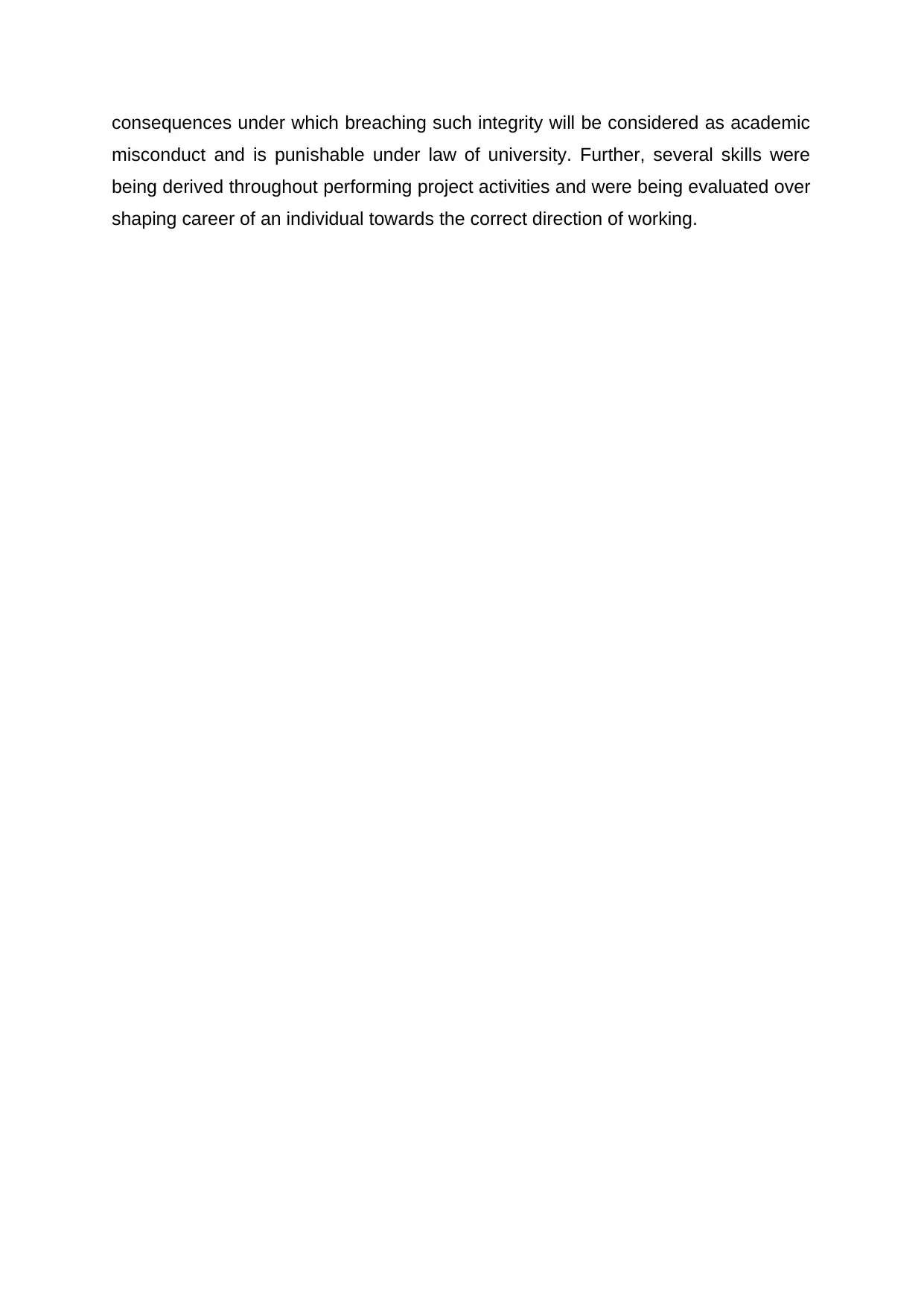
consequences under which breaching such integrity will be considered as academic
misconduct and is punishable under law of university. Further, several skills were
being derived throughout performing project activities and were being evaluated over
shaping career of an individual towards the correct direction of working.
misconduct and is punishable under law of university. Further, several skills were
being derived throughout performing project activities and were being evaluated over
shaping career of an individual towards the correct direction of working.
Paraphrase This Document
Need a fresh take? Get an instant paraphrase of this document with our AI Paraphraser
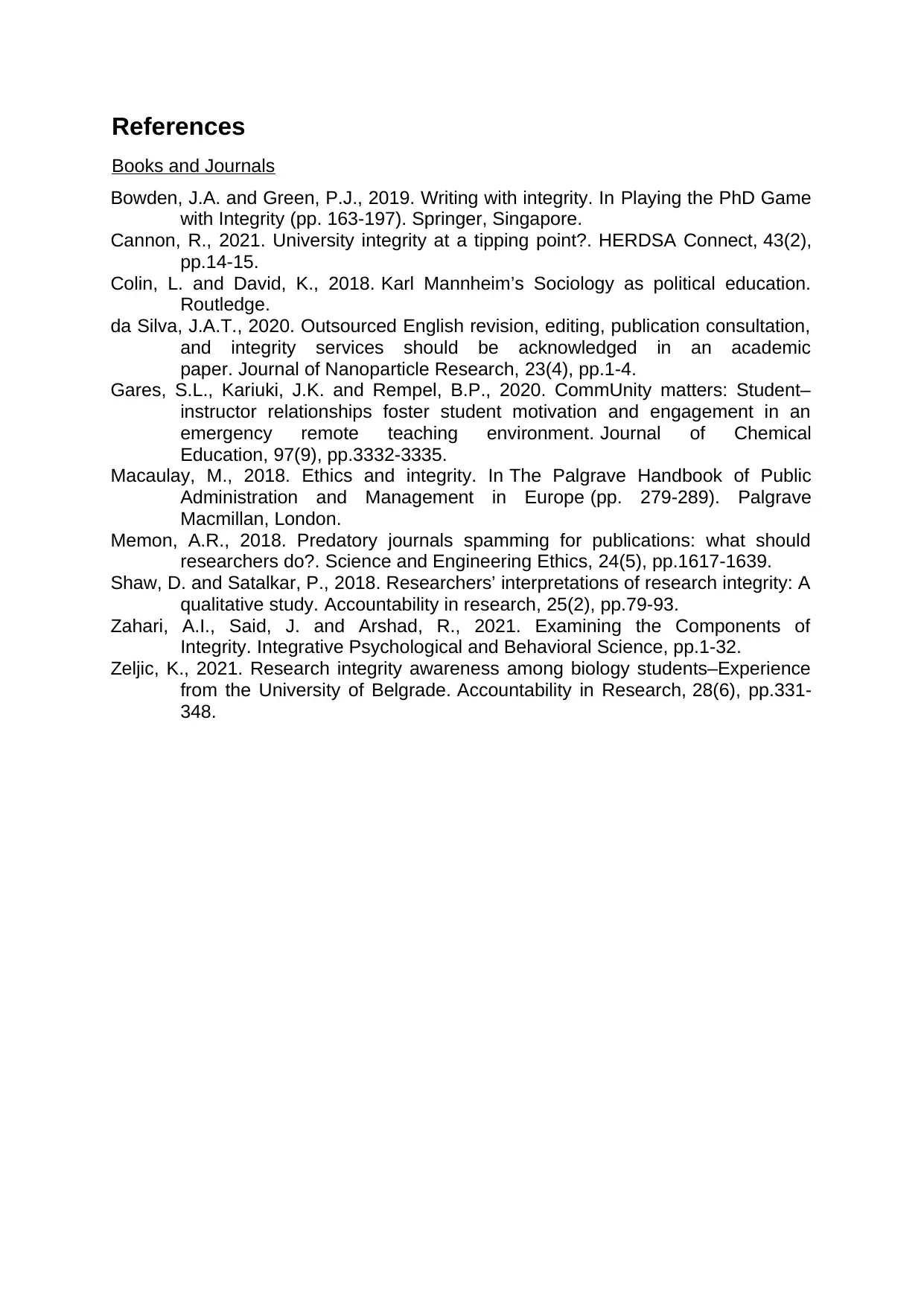
References
Books and Journals
Bowden, J.A. and Green, P.J., 2019. Writing with integrity. In Playing the PhD Game
with Integrity (pp. 163-197). Springer, Singapore.
Cannon, R., 2021. University integrity at a tipping point?. HERDSA Connect, 43(2),
pp.14-15.
Colin, L. and David, K., 2018. Karl Mannheim’s Sociology as political education.
Routledge.
da Silva, J.A.T., 2020. Outsourced English revision, editing, publication consultation,
and integrity services should be acknowledged in an academic
paper. Journal of Nanoparticle Research, 23(4), pp.1-4.
Gares, S.L., Kariuki, J.K. and Rempel, B.P., 2020. CommUnity matters: Student–
instructor relationships foster student motivation and engagement in an
emergency remote teaching environment. Journal of Chemical
Education, 97(9), pp.3332-3335.
Macaulay, M., 2018. Ethics and integrity. In The Palgrave Handbook of Public
Administration and Management in Europe (pp. 279-289). Palgrave
Macmillan, London.
Memon, A.R., 2018. Predatory journals spamming for publications: what should
researchers do?. Science and Engineering Ethics, 24(5), pp.1617-1639.
Shaw, D. and Satalkar, P., 2018. Researchers’ interpretations of research integrity: A
qualitative study. Accountability in research, 25(2), pp.79-93.
Zahari, A.I., Said, J. and Arshad, R., 2021. Examining the Components of
Integrity. Integrative Psychological and Behavioral Science, pp.1-32.
Zeljic, K., 2021. Research integrity awareness among biology students–Experience
from the University of Belgrade. Accountability in Research, 28(6), pp.331-
348.
Books and Journals
Bowden, J.A. and Green, P.J., 2019. Writing with integrity. In Playing the PhD Game
with Integrity (pp. 163-197). Springer, Singapore.
Cannon, R., 2021. University integrity at a tipping point?. HERDSA Connect, 43(2),
pp.14-15.
Colin, L. and David, K., 2018. Karl Mannheim’s Sociology as political education.
Routledge.
da Silva, J.A.T., 2020. Outsourced English revision, editing, publication consultation,
and integrity services should be acknowledged in an academic
paper. Journal of Nanoparticle Research, 23(4), pp.1-4.
Gares, S.L., Kariuki, J.K. and Rempel, B.P., 2020. CommUnity matters: Student–
instructor relationships foster student motivation and engagement in an
emergency remote teaching environment. Journal of Chemical
Education, 97(9), pp.3332-3335.
Macaulay, M., 2018. Ethics and integrity. In The Palgrave Handbook of Public
Administration and Management in Europe (pp. 279-289). Palgrave
Macmillan, London.
Memon, A.R., 2018. Predatory journals spamming for publications: what should
researchers do?. Science and Engineering Ethics, 24(5), pp.1617-1639.
Shaw, D. and Satalkar, P., 2018. Researchers’ interpretations of research integrity: A
qualitative study. Accountability in research, 25(2), pp.79-93.
Zahari, A.I., Said, J. and Arshad, R., 2021. Examining the Components of
Integrity. Integrative Psychological and Behavioral Science, pp.1-32.
Zeljic, K., 2021. Research integrity awareness among biology students–Experience
from the University of Belgrade. Accountability in Research, 28(6), pp.331-
348.
1 out of 8
Related Documents
Your All-in-One AI-Powered Toolkit for Academic Success.
+13062052269
info@desklib.com
Available 24*7 on WhatsApp / Email
![[object Object]](/_next/static/media/star-bottom.7253800d.svg)
Unlock your academic potential
Copyright © 2020–2026 A2Z Services. All Rights Reserved. Developed and managed by ZUCOL.
